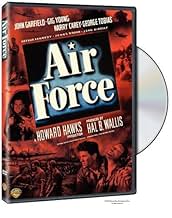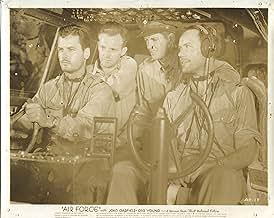CALIFICACIÓN DE IMDb
7.0/10
3.9 k
TU CALIFICACIÓN
Agrega una trama en tu idiomaThe crew of an Air Force bomber arrives in Pearl Harbor in the aftermath of the Japanese attack on December 7, 1941, and is sent on to Manila to help with the defense of the Philippines.The crew of an Air Force bomber arrives in Pearl Harbor in the aftermath of the Japanese attack on December 7, 1941, and is sent on to Manila to help with the defense of the Philippines.The crew of an Air Force bomber arrives in Pearl Harbor in the aftermath of the Japanese attack on December 7, 1941, and is sent on to Manila to help with the defense of the Philippines.
- Ganó 1 premio Óscar
- 2 premios ganados y 3 nominaciones en total
Edward Brophy
- Marine Sgt. J.J. Callahan
- (as Edward S. Brophy)
Argumento
¿Sabías que…?
- TriviaAerial scenes were filmed in Texas and Florida because airplanes appearing to be Japanese were not allowed on the west coast due to a fear of Japanese invasion.
- ErroresDespite reports by Susan McMartin and other characters attributing the loss of planes at Hickham Field and attacks on civilians to Japanese-American saboteurs in bomb-ladened vegetable trucks, there were in fact no actual acts of sabotage. The reports made in the film were propaganda reflecting the hysteria of time.
- Citas
Sgt. Joe Winocki: [overhearing the Pearl Harbor attack on the radio] Hey, Peterson, who you got tuned in, Orson Welles?
- Créditos curiososOpening credits prologue: FOREWORD "It is for us the living .... to be dedicated here to the unfinished work which they who fought here have thus far so nobly advanced ..... It is ......for us to be here dedicated to the great task remaining before us ..... that this nation, under God, shall have a new birth of freedom and that government of the people, by the people, for the people, shall not perish from the earth." Abraham Lincoln
- ConexionesEdited into Remembranzas de guerra: Part IV (1988)
- Bandas sonorasThe Army Air Corps Song
(1939) (uncredited)
("Off We Go Into the Wild Blue Yonder")
Written by Robert Crawford
Played during the opening credits and often throughout the film
Opinión destacada
For modern viewers, this is truly a movie for airplane buffs. How many movies can you find with early B-17s flying? I have always appreciated this movie for that purpose. Those early birds without tail guns and power turrets were all gone by wars end. This movie was made during the dark days of WWII for America and the 'D' models were still fairly new and in use stateside as training aircraft. Thankfully the producers just went to real Army Air Fields and used existing equipment. That is wonderful visual documentation for history buffs! Many 'props' were real! The Air Corps thermos bottles and the Air Crew bandoleers for pistol ammunition were great to see documented.
This was a wartime movie made in a period where we had suffered lots of defeats and few victories. The young men being sent off to war had grown up being taught not to kill their fellow humans. Most of the early war 'propaganda' films went to lengths to 'dehumanize' the enemy so that a young American entering combat would not be conflicted. This happens in all wars but is more obvious to us today due to the amount of films made during WWII. Regarding the talk of 'fifth column' work at Pearl Harbor, I believe some have missed the point of the propaganda. We have become so aware of the race issue that we miss the point made in the film. It was not so much to single out the Japanese ancestry citizens of Hawaii as to make the American people think that it wasn't our military's fault that we were caught by surprise. The theme in that scene and later on Wake Island proffered that 'our boys don't lose in an even fight'. It was to establish confidence in our military and equipment. The idea was to tell the U.S. civilian population that we couldn't lose unless stabbed in the back. Actually, much of our equipment of the time was inferior to our opponents. We also had mostly 'green' troops whereas the Japanese had a lot of combat experienced pilots and troops. It was a tough fight all the way through and our veterans deserve full credit for winning.
This movie is entertaining and a great one for airplane/history buffs who know what is 'right' and what isn't correct. Politically it is dated and must be taken in context. It is still fun to watch and worth your time.
This was a wartime movie made in a period where we had suffered lots of defeats and few victories. The young men being sent off to war had grown up being taught not to kill their fellow humans. Most of the early war 'propaganda' films went to lengths to 'dehumanize' the enemy so that a young American entering combat would not be conflicted. This happens in all wars but is more obvious to us today due to the amount of films made during WWII. Regarding the talk of 'fifth column' work at Pearl Harbor, I believe some have missed the point of the propaganda. We have become so aware of the race issue that we miss the point made in the film. It was not so much to single out the Japanese ancestry citizens of Hawaii as to make the American people think that it wasn't our military's fault that we were caught by surprise. The theme in that scene and later on Wake Island proffered that 'our boys don't lose in an even fight'. It was to establish confidence in our military and equipment. The idea was to tell the U.S. civilian population that we couldn't lose unless stabbed in the back. Actually, much of our equipment of the time was inferior to our opponents. We also had mostly 'green' troops whereas the Japanese had a lot of combat experienced pilots and troops. It was a tough fight all the way through and our veterans deserve full credit for winning.
This movie is entertaining and a great one for airplane/history buffs who know what is 'right' and what isn't correct. Politically it is dated and must be taken in context. It is still fun to watch and worth your time.
- maddutchy
- 5 ene 2007
- Enlace permanente
Selecciones populares
Inicia sesión para calificar y agrega a la lista de videos para obtener recomendaciones personalizadas
- How long is Air Force?Con tecnología de Alexa
Detalles
- Fecha de lanzamiento
- País de origen
- Sitio oficial
- Idiomas
- También se conoce como
- Contra el sol naciente
- Locaciones de filmación
- Productora
- Ver más créditos de la compañía en IMDbPro
Taquilla
- Presupuesto
- USD 2,646,000 (estimado)
- Tiempo de ejecución2 horas 4 minutos
- Color
- Relación de aspecto
- 1.37 : 1
Contribuir a esta página
Sugiere una edición o agrega el contenido que falta

Principales brechas de datos
What is the German language plot outline for Los que supieron morir (1943)?
Responda




































